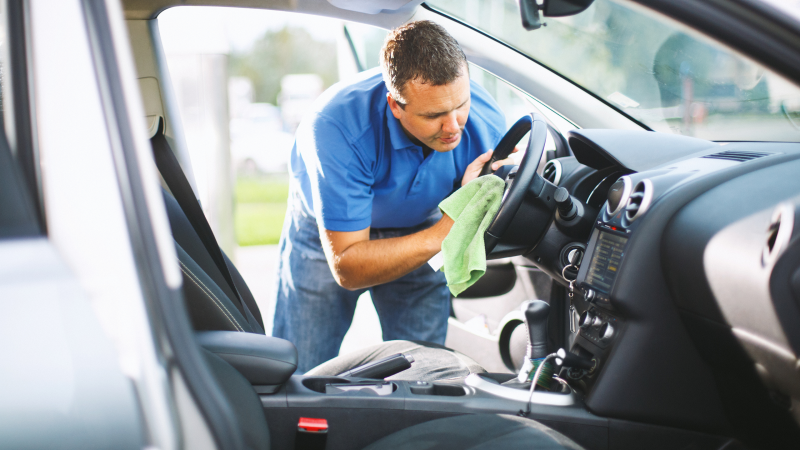How to increase your car's resale value

Car resale value refers to the amount a used car is likely to fetch on the open market in its current state. Sadly, car owners who leave thinking about vehicle resale value until it’s time to sell their car often do so at their own detriment. By paying attention to a car’s resale value early on, you can potentially maximize your returns in the long run. Let’s learn more about what goes into determining a car’s resale value.
Factors that affect car resale value
When you’re trying to figure out “What is the resale value of my car?”, there are several factors to take into consideration. These include:
Make and model
All cars are not made equal, and some cars just have an inherently higher resale value due to their make and model. Luxury cars and SUVs, for instance, may sometimes have better-than-average resale values. There are also certain car brands that tend to hold their value across the board due to a reputation for reliability.
Condition
The condition of the car is, naturally, going to play a role in the car’s resale value. Cars that have been well-maintained, regularly serviced and feature a clean vehicle history are likely to sell better than cars that are dingy, dirty and in obvious need of repairs.
Mileage and age
Both the mileage and the age of a car will affect its vehicle resale value, with the value typically going down as either of those factors goes up. That said, the age of a car is usually considered less of a detriment to its value than its mileage, and age may even become a selling point if the car is considered a classic.
Modifications
Car modifications can potentially help or hinder your efforts to maximize your car resale value. Some modifications like Bluetooth connectivity, infotainment systems or parking assist can be highly sought-after and raise the resale value. Conversely, there are other modifications like tinted windows, body kits, decals or bumper stickers that are more likely to lower the resale value. As a rule of thumb, it may help to avoid highly specific or customized modifications. These tend to have a narrower appeal, which limits vehicle resale value.
Color
Similar to the above, the color of a car can also influence its resale value. More common colors like black, white or silver, for example, are typically easier to sell and therefore have a higher resale value than something like neon green, which would likely require finding a more specific buyer.
Tips to maximize car resale value
You may be starting to appreciate how it helps to start thinking about car resale value early on. The make and model of car you choose can have a big impact on what it fetches when it’s time to sell, but there are other things you can potentially do to raise or maintain car value as well. Here are a few tips to consider:
Avoiding smoking or eating in the car
Smoking inside the car may cause unpleasant odors to become embedded into your car’s interior. This will typically lower resale value quite a bit. You could try to rectify this before you sell but it’ll likely cost you, thereby cutting into what you’d make from a sale.
Eating and drinking should be avoided for similar reasons, as spilled food or beverages can cause stains and odors as well.
Keeping pets off the upholstery
Pets add so much joy to our lives, but unfortunately, they’re not quite as joyful for your car’s upholstery. Besides the risk of potential damage from scratching or biting, our furry friends can be unpredictable in other ways like having accidents or getting sick in the car. If you plan to regularly bring your pets along with you, it may be beneficial to invest in some pet-friendly solutions like upholstery mats designed for pet use.
Being thoughtful with upgrades
If you recall from above, modifications to your car can go either way when it comes to vehicle resale value. As such, it helps to be extra thoughtful when considering upgrades and modifications to your car.
Keeping thorough documentation
Keeping thorough records of servicing and repairs your car has received can help reassure potential buyers about the car’s condition and may indicate that you were similarly careful with the car itself.
Making any necessary repairs
This refers to any necessary repairs the vehicle needs to be presentable for a sale, but it could also apply to the general repairs it needed over the course of your ownership. Staying on top of car repairs as they come is a generally good practice that can help prevent small problems from turning into big ones.
Thoroughly cleaning the vehicle
When it’s time to start thinking about selling the car, it helps to give it a thorough cleaning — inside and out — so that it presents well. You can either put in the elbow grease to do it yourself or get a professional service to do it for you.
Taking high quality photos
If you decide to sell the car yourself rather than trading it in, creating an effective car ad is something of an art in and of itself. Once you’ve got your car thoroughly cleaned up, it’s time to take some high-quality photos of the exterior and interior.
Taking your car to a location that can provide an aesthetically pleasing backdrop may sound like a lot, but something as simple as shooting it in your neighbor’s recently refinished driveway at sunset vs. a dingy parking lot at night can make a huge difference in how buyers perceive your car. It's ok to try to photograph the car in its most flattering light, but it may also help to be upfront about any flaws the buyer would notice in person.
In summary
As you can see, car resale value can be more dynamic than it might appear to be on the surface. While there are factors like the make, model and brand that can affect vehicle resale value immediately, other factors like how you maintain and use it can cause the car’s resale value to fluctuate over the course of your ownership. Finally, how you present the car when it’s time to sell may also have an influence on its ultimate vehicle resale value.



